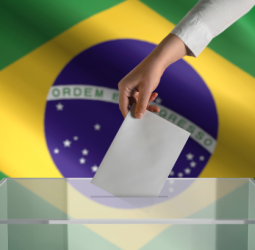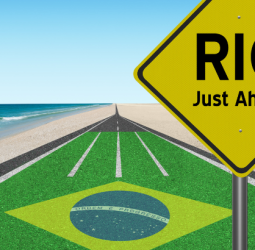The Brazilian presidential campaign is in full swing, as the country gears up to elect its next leader. With a population of over 200 million and a rapidly growing economy, Brazil plays a crucial role on the global stage. The presidential campaign in Brazil is one of the most closely watched and debated events not just within the country, but also across the world.
The campaign for the 2018 Brazilian presidential elections officially began on August 16, with the candidates vying for the top position going head-to-head in a series of debates and rallies. The election is set to take place on October 7, with a possible runoff on October 28 if no candidate secures a majority in the first round.
The current presidential campaign has been an eventful one, with a significant shift in the political landscape of Brazil. After 13 years of rule by the leftist Workers' Party, the country is seeing a rise in conservative and right-wing candidates. The main contenders for the presidency are Jair Bolsonaro of the Social Liberal Party, Ciro Gomes of the Democratic Labor Party, Fernando Haddad of the Workers' Party, and Geraldo Alckmin of the Brazilian Social Democracy Party.
One of the key issues dominating the presidential campaign in Brazil is the state of the economy. The country has faced its worst recession in history, with unemployment and inflation rates hitting record highs. The candidates have put forth their plans to jumpstart the economy and create jobs, with each offering different solutions and strategies.
Another important issue in the campaign is corruption. Brazil has been rocked by numerous corruption scandals in recent years, leading to widespread public dissatisfaction and distrust in the government. The candidates have addressed this issue by promising to tackle corruption and bring about much-needed transparency and accountability in the political system.
A major factor that has influenced the Brazilian presidential campaign is the imprisonment of former President Luiz Inácio Lula da Silva. Lula, as he is popularly known, was the front-runner in the polls until his conviction on corruption charges in April. He was barred from running for presidency, which has shifted the dynamics of the race.
The presidential campaign in Brazil has also seen a rise in social media influence. With the country having one of the highest rates of social media usage in the world, candidates are using platforms like Facebook, Twitter, and Instagram to connect with voters and promote their agendas. This has opened up new avenues for campaigning and reaching out to a wider audience.
The outcome of the Brazilian presidential campaign will have significant implications not just for the country, but also for the region and the world. Brazil is a key player in Latin America and a major economic powerhouse. The policies and decisions made by the next president will have a ripple effect on the global stage.
As the Brazilian people prepare to cast their votes, it is clear that this presidential campaign is one of the most crucial and closely contested in recent history. The candidates are making their final pitches to the voters, hoping to secure their trust and support. Come October 7, the world will be watching as Brazil chooses its next leader.
The campaign for the 2018 Brazilian presidential elections officially began on August 16, with the candidates vying for the top position going head-to-head in a series of debates and rallies. The election is set to take place on October 7, with a possible runoff on October 28 if no candidate secures a majority in the first round.
The current presidential campaign has been an eventful one, with a significant shift in the political landscape of Brazil. After 13 years of rule by the leftist Workers' Party, the country is seeing a rise in conservative and right-wing candidates. The main contenders for the presidency are Jair Bolsonaro of the Social Liberal Party, Ciro Gomes of the Democratic Labor Party, Fernando Haddad of the Workers' Party, and Geraldo Alckmin of the Brazilian Social Democracy Party.
One of the key issues dominating the presidential campaign in Brazil is the state of the economy. The country has faced its worst recession in history, with unemployment and inflation rates hitting record highs. The candidates have put forth their plans to jumpstart the economy and create jobs, with each offering different solutions and strategies.
Another important issue in the campaign is corruption. Brazil has been rocked by numerous corruption scandals in recent years, leading to widespread public dissatisfaction and distrust in the government. The candidates have addressed this issue by promising to tackle corruption and bring about much-needed transparency and accountability in the political system.
A major factor that has influenced the Brazilian presidential campaign is the imprisonment of former President Luiz Inácio Lula da Silva. Lula, as he is popularly known, was the front-runner in the polls until his conviction on corruption charges in April. He was barred from running for presidency, which has shifted the dynamics of the race.
The presidential campaign in Brazil has also seen a rise in social media influence. With the country having one of the highest rates of social media usage in the world, candidates are using platforms like Facebook, Twitter, and Instagram to connect with voters and promote their agendas. This has opened up new avenues for campaigning and reaching out to a wider audience.
The outcome of the Brazilian presidential campaign will have significant implications not just for the country, but also for the region and the world. Brazil is a key player in Latin America and a major economic powerhouse. The policies and decisions made by the next president will have a ripple effect on the global stage.
As the Brazilian people prepare to cast their votes, it is clear that this presidential campaign is one of the most crucial and closely contested in recent history. The candidates are making their final pitches to the voters, hoping to secure their trust and support. Come October 7, the world will be watching as Brazil chooses its next leader.
You Must be Registered Or Logged in To Comment Log In?



 politics live casino
politics live casino


















